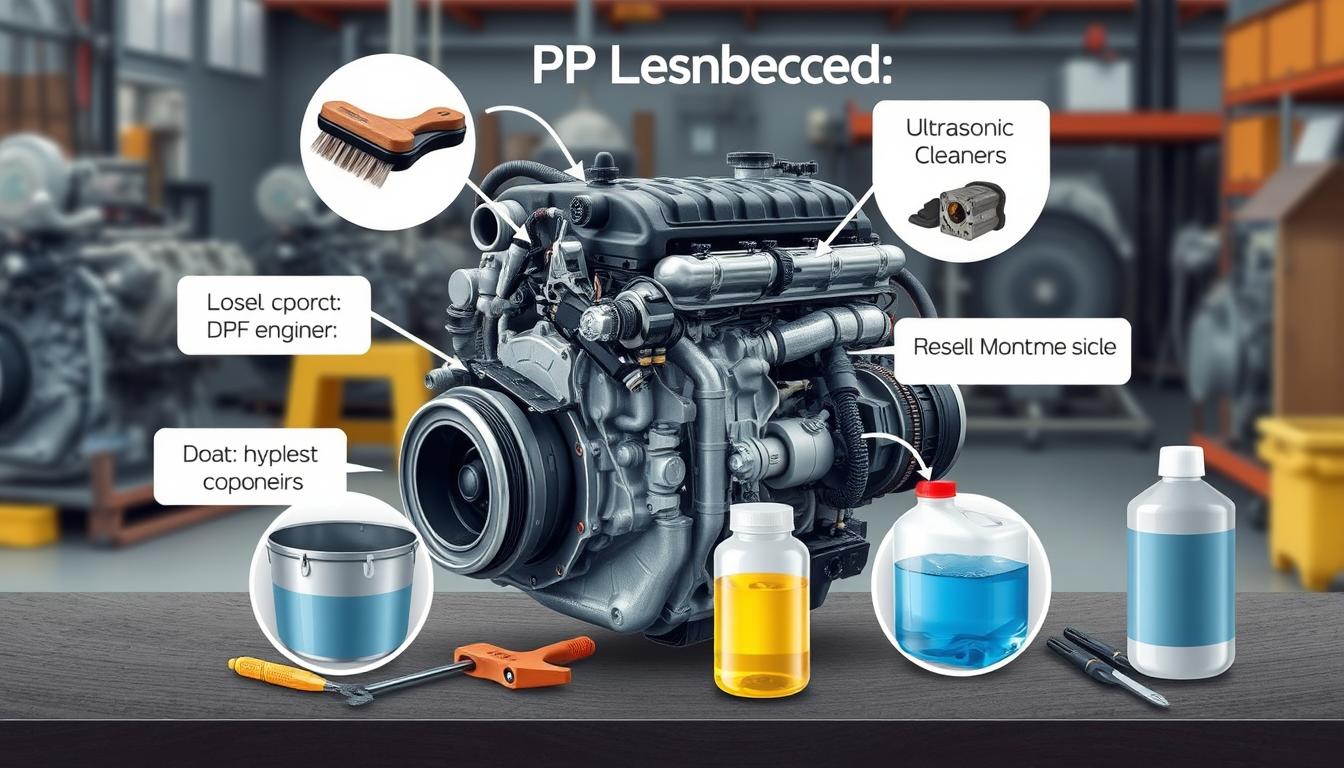How to Avoid DPF Problems – Protect Your Diesel Engine
How to Avoid DPF Problems – Protect Your Diesel Engine
Diesel engines are known for their power and fuel efficiency. However, they need proper care for the Diesel Particulate Filter (DPF) system. The DPF is key in cutting down harmful emissions. If you ignore it, you might face expensive issues later.
In this article, we’ll examine DPF systems and share tips for avoiding common problems, which will help your diesel engine perform at its best.
Key Takeaways
- The Diesel Particulate Filter (DPF) is a crucial component in diesel engines that reduces harmful emissions.
- Proper DPF maintenance protects your diesel engine and ensures optimal performance.
- Understanding how DPF systems work and recognizing early warning signs of problems can help you prevent costly repairs.
- Professional maintenance and cleaning solutions are important for maintaining DPF efficiency and longevity.
- Adhering to recommended DPF maintenance schedules can extend the life of your diesel engine and save you money in the long run.
Understanding DPF Systems and Their Critical Role in Diesel Engines
Diesel engines are popular for their fuel efficiency and power. They need effective emissions control systems. The diesel particulate filter (DPF) is key to reducing emissions from diesel vehicles.
How Diesel Particulate Filters Work
The DPF captures soot and particulate matter from diesel engines. This process, called regeneration, keeps the engine running well and reduces harmful emissions. Knowing how DPF systems work helps us see their importance in diesel engines.
The Impact of DPF on Engine Performance
Adding a DPF can affect engine performance. It reduces emissions but can increase back pressure. This might lead to less power and fuel efficiency. Regular maintenance and monitoring of the DPF system are crucial for optimal engine performance.
Common DPF Components and Their Functions
Understanding the DPF system requires knowing its main parts and what they do. These include the particulate filter, diesel oxidation catalyst, exhaust temperature sensor, and control module. Knowing each part’s role helps in diagnosing and fixing problems.
| Component | Function |
|---|---|
| Particulate Filter | Captures and stores soot and particulate matter from the engine’s exhaust |
| Diesel Oxidation Catalyst | Converts harmful emissions into less toxic substances |
| Exhaust Temperature Sensor | Monitors the temperature of the exhaust system to optimize the regeneration cycle |
| Control Module | Manages the DPF system’s operation and monitors its performance |
Knowing the DPF system’s components and their roles helps us fix problems. This ensures our diesel engines run well for a long time.
How to Avoid DPF Problems: Essential Prevention Tips
Keeping your diesel particulate filter (DPF) healthy is key for your engine’s long life. By being proactive and following simple steps, you can avoid DPF issues. Here are the top tips to keep your vehicle in top shape.
Embrace DPF-Friendly Driving Habits
Your driving habits greatly affect your DPF’s performance and life. Here are some dpf-friendly driving habits to help:
- Avoid idling or driving at low speeds too much, as it can stop the DPF from regenerating fully.
- Drive on highways at higher speeds often to help the DPF regenerate.
- Keep a steady speed and avoid stop-and-go driving, which can stress the DPF system.
Prioritize Proactive Maintenance and DPF cleaning methods
Regular DPF maintenance and cleaning are vital to avoid problems. Here are some best practices:
- Stick to the manufacturer’s DPF maintenance schedule for timely service and cleaning.
- Choose professional DPF cleaning services for thorough cleaning without damage.
- Don’t try DIY DPF cleaning, as it can cause more harm than good.
By following these prevention tips, you can protect your diesel engine’s DPF system. Enjoy a smooth, efficient, and worry-free drive.
“Regular maintenance and cleaning of your DPF are crucial to prevent issues.”
Recognizing Early Warning Signs of DPF Issues
Knowing about diesel particulate filter (DPF) problems early can save you a lot of time and money. Spotting early signs lets you fix issues before they get worse and cost a lot to repair. Here are the main signs that might mean you have a DPF problem in your vehicle.
Interpreting Dashboard Warning Lights
Your car’s dashboard warns you when something’s off, including DPF issues. Look out for the DPF warning light reset or similar lights. These lights mean you might have a DPF problem. Paying attention to them can help you fix issues before they get worse.
Performance Changes That Signal DPF Problems
Changes in how your car runs can also hint at DPF clogging symptoms. If your car uses more fuel, has less power, or makes more noise, it might be a sign of a clogged DPF. Don’t ignore these signs, as they could mean a bigger problem is coming.
When to Seek Professional Diagnosis
If you see any of these warning signs, get your car checked by a pro. A skilled mechanic can find the problem and tell you what to do next. This could be a simple cleaning or a bigger fix. Fixing DPF problems early can save you from expensive repairs later.
By watching for early signs of DPF issues, you can keep your diesel engine healthy and avoid expensive breakdowns. Fixing DPF problems quickly helps your car run well and last longer.
Professional Maintenance and Cleaning Solutions
Keeping your diesel particulate filter (DPF) in good shape is key to your engine’s health. Regular checks and timely cleanings are a must. But sometimes, you need more than that. Let’s look at the professional options and how to pick the right one for you.
Chemical vs. Physical Cleaning Methods
There are two main ways to clean a DPF: chemical and physical. Chemical cleaning uses special solutions to break down dirt. Physical cleaning uses air pressure or ultrasonic waves to remove it. The best method depends on your DPF’s condition and your service provider’s advice.
Choosing the Right Service Provider
Finding a skilled service provider is essential for DPF care. Look for those who focus on diesel engines and have the right tools and knowledge. Don’t go for DPF delete kits, as they can harm your engine and emissions system, leading to big problems.
Maintenance Schedule Recommendations
The right maintenance schedule for your DPF depends on your driving habits and vehicle type. Generally, check and clean your DPF every 50,000 to 100,000 miles, or as your car’s maker suggests. Regular maintenance can make your DPF last longer, save fuel, and avoid costly repairs.
FAQ
1- What are the common causes of DPF problems?
DPF problems often come from soot buildup, engine oil contamination, and regeneration issues. Driving habits like short trips or idling can also cause problems. These habits lead to clogging and early failure of the DPF.
2- How can I prevent DPF problems?
To avoid DPF issues, stick to the maintenance schedule set by the manufacturer. Drive at higher speeds to help the DPF regenerate. Also, try to avoid idling and short trips.
Regular checks and professional cleanings can also help your DPF last longer.
3- What are the symptoms of a clogged or malfunctioning DPF?
Signs of a clogged or faulty DPF include dashboard lights and lower fuel efficiency. You might also notice less engine power and more exhaust emissions. In bad cases, the DPF can block completely, causing the engine to stall or shut off.
4- Can I remove or delete the DPF system?
While some kits are available for DPF deletion, we advise against it. It’s often illegal and can harm the environment and your engine. Keeping the DPF system in good shape is safer and more responsible.
5- How much does it cost to replace a DPF?
Replacing a DPF can cost between $1,000 and $3,000, depending on your vehicle and the repair shop. Regular care and prevention can help your DPF last longer, saving you money.







